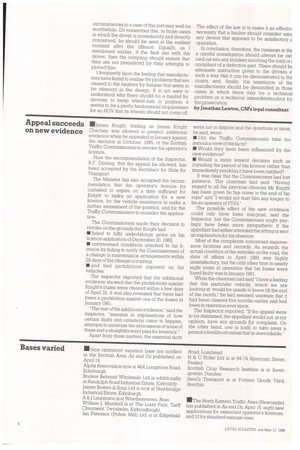Appeal succeeds NI on new evidence
Page 36

If you've noticed an error in this article please click here to report it so we can fix it.
— James Knight, trading as James Knight Coaches, was allowed to present additional evidence when he appealed in January against the decision in October, 1985, of the Scottish Traffic Commissioners to revoke his operator's licence.
Now the recommendation of the Inspector, R.F. Darling, that the appeal be allowed, has been accepted by the Secretary for State for Transport.
The Minister has also accepted the recommendation that the operators licence by curtailed to expire on a date sufficient for Knight to make an application for a new licence, for the vehicle examiners to make a further assessment of the position, and for the Traffic Commissioners to consider the application.
The Commissioners made their decision to revoke on the grounds that Knight had: • failed to fulfil undertakings given on his licence application of December 20, 1982; • contravened conditions attached to his licence by failing to notify the Commissioners of a change in maintenance arrangements within 28 days of the change occurring; • and had prohibitions imposed on his vehicles.
The inspector reported that the additional evidence showed that the prohibitions against Knight's buses were cleared within a few days of April 22. It was also revealed that there had been a prohibition against one of the buses in January 1981.
"The rest of the additional evidence," said the inspector, "amounts to explanations of how certain faults and omissions came to happen, attempts to minimise the seriousness of some of these and a straightforward plea for leniency."
Apart from those matters, the essential facts were not in dispute and the questions at issue, he said, were: • Did the Traffic Commissioners take too serious a view of the facts?
• Would they have been influenced by the new evidence?
• Would a more lenient decision such as curtailing the period of the licence rather than immediately revoking it have been justified?
It was clear that the Commissioners had lost patience. The chairman had said: "Having regard to all the previous chances Mr Knight has been given he has come to the end of his rope" and "1 would not trust him any longer to be an operator of PSVs."
The possible effect of the new evidence could only have been marginal, said the Inspector, but the Commissioners might perhaps have been more sympathetic if the appellant had either attended the sitting or sent an explanation for his absence.
Most of the complaints concerned maintenance facilities and records, As regards the actual condition of the vehicles on the road, the state of affairs in April 1985 was highly unsatisfactory, but the only other time in nearly eight years of operation that his buses were found faulty was in January 1981.
While the chairman had said "I have a feeling that this particular vehicle, which we are looking at, would be unsafe to leave till the end of the month," he had seemed unaware that it had been cleared five months earlier and had been in operation ever since.
The Inspector reported: "If the appeal were to be dismissed, the appellant would not, in my opinion, have any grounds for complaint. On the other hand, one is loath to take away a person's livelihood unless that is unavoidable."






















































































